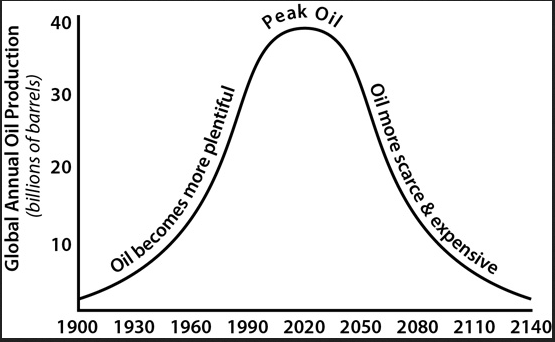The concept of peak oil derives from the characteristic of oil that it is not renewable. It is finite. Once extracted, it can be used but then it’s gone. In contrast, wind and sun are renewable sources of energy. Use some, there’s lots more.
Since oil is limited, there comes a moment or period of time — at least hypothetically — when we reach the point of maximum global production, the peak, and any more production begins to drain what is left. Eventually we use up all that remains and we run out of oil.

Determining when we reach the peak is not always clear. A declining demand for oil will affect the extraction and use of oil, even if there is an abundant supply still left. In contrast, we may estimate the peak but the discovery of a new supply of oil will extend the life of oil as an energy source. Or we may develop new technology, like fracking, that will extend the period when oil will be available.
Some further ideas to explore on Peak Oil
What are the current estimates for the peak in global oil production?
If there is a consensus for a moment or period of time when we will reach a peak in oil production, what are the economic implications for the oil industry?
Which other businesses or economic sectors would be most affected by a peak in oil production?
Sources
“Exploring Hydrocarbom Depletion,” Peak Oil bit.ly/33the Ven3A
Katherine Gallagher, “What Is Peak Oil? Have We Reached It?” Treehugger: Sustainability for All (13 August 2021). bit.ly/35xVOmy
Will Kenton, “Peak Oil,” Investopedia (12 August 2021). bit.ly/3vlzWFZ


No comments yet, add your own below